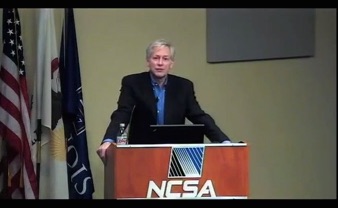In this video from the NCSA Blue Waters Symposium, Ed Seidel from NCSA presents: Supercomputing in an Era of Big Data and Big Collaboration.
Supercomputing has reached a level of maturity and capability where many areas of science and engineering are not only advancing rapidly due to computing power, they cannot progress without it. Detailed simulations of complex astrophysical phenomena, HIV, earthquake events, and industrial engineering processes are being done, leading to major scientific breakthroughs or new products that cannot be achieved any other way. These simulations typically require larger and larger teams, with more and more complex software environments to support them, as well as real world data. But as experiments and observation systems are now generating unprecedented amounts of data, which also must be analyzed via large-scale computation and compared with simulation, a new type of highly integrated environment must be developed where computing, experiment, and data services will need to be developed together. I will illustrate examples from NCSA’s Blue Waters supercomputer, and from major data-intensive projects including the Large Synoptic Survey Telescope, and give thoughts on what will be needed going forward.
NCSA director Edward Seidel is a distinguished researcher in high-performance computing and relativity and astrophysics with an outstanding track record as an administrator. In addition to leading NCSA, he is also a Founder Professor in the University of Illinois Department of Physics and a professor in the Department of Astronomy. Seidel is a fellow of the American Physical Society and of the American Association for the Advancement of Science, as well as a member of the Institute of Electrical and Electronics Engineers and the Society for Industrial and Applied Mathematics. His research has been recognized by a number of awards, including the 2006 IEEE Sidney Fernbach Award, the 2001 Gordon Bell Prize, and 1998 Heinz-Billing-Award.




